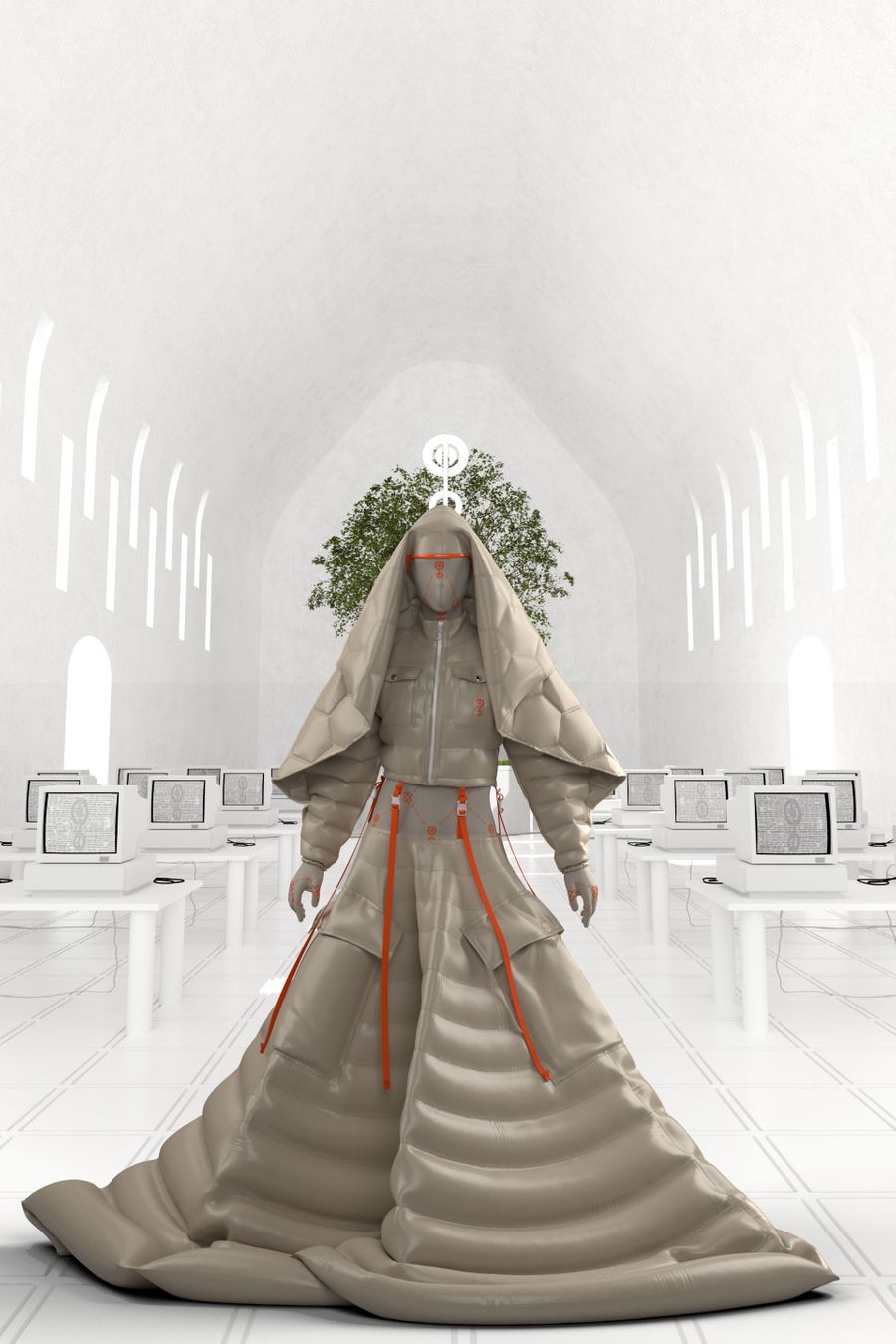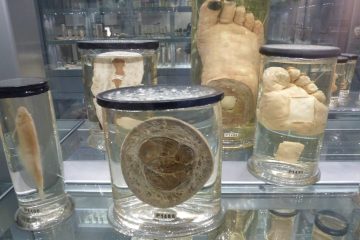
Convinced by two minxy swindlers, a pompous rich man strides down the streets completely butt naked, happy in the belief that the silks are only invisible to those that are stupid. So goes Anderson’s folktale The Emperor’s New Clothes, and coincidently mirroring everyone’s earliest nightmare as a child of turning up to school with no clothes on.
But now, with the fashion industry’s big leagues entering the gaming world, and dreaming of NFT’s, the alluring reminder of fantasy in fashion seems the more prominent lesson to learn here.

Placebo digital fashion house
When you wear clothes, you are wearing the dream of someone, in some sense, you are already wearing something of a somewhat fantasy.
Not quite at invisible silk level, houses like Louis Vuitton have been playing with their version of the ‘invisible’, with green screens coming into virtual play at their women’s S/S21 show. Most recently, Gucci have begun ‘testing Luxury’s Allure in the Metaverse’ leaping into the immersive digital world.
But there is an even bigger, more fantastical shift, that is not a world away from The Emperor’s tale, and it comes in the form of virtual couturiers. They create items which can’t be seen by the naked eye, only coming to life behind a phone screen. You can’t touch them, you can’t pull them out of your wardrobe and step in, but they are real on screen, and they are being bought.
Fashion is carving the way we move into the future, where we spend more and more time in virtual spaces, and most importantly what we will wear when we get there.
Fashion rests on a violent sensation of time. Each year fashion destroys that which it has just been admiring; it adores that which it is about to destroy.
Roland Barthes wrote in Marie Claire in 1967, ‘Fashion rests on a violent sensation of time. Each year fashion destroys that which it has just been admiring; it adores that which it is about to destroy’.
Destruction is well underway. We love clothes, the landfills can testify to that. And under this unsteady heap, a bigger shift, one that is more sustainable and an answer to our throw-away culture, is occurring.
We speak to one of the rising stars of fashion designers who creates solely digital ready-to-wear, Roei Derhi, Co-Founder of Placebo.
Charming and future forward, we spoke about sustainability for our world, emotional connection without touch, and rewriting the patriarchal world of gaming.
Shall we?

The Fabricant’s “iridescence dress”. An NFT dress designed by Dutch digital fashion studio The Fabricant.
How did you start? What was your journey? You currently work at H&M as a designer, and also now have made this move into virtual fashion. So apart from not sleeping a lot, how have you been making that shift?
So I began this start up company 4 years ago, which used a lot of 3D programmes. It didn’t work out, but I looked at how we can use 3D to create a better pipeline process in making physical fashion and then I realised, oh my god, it could actually be the end project. So that’s how Placebo was created.
Why did you call is Placebo?
I joke that it’s because it sounds like a good perfume. But really its about creating a placebo effect, giving you a feeling. The clothes feel like they are there, but they can’t be physically touched.
How do you find it different working in physical and digital fashion? Is one more creative than the other?
Digital fashion brings back the control of the design process because you can do so much when it comes back to digital fashion, you don’t need to think about the commercial side so much. You think about the user of course, but it’s in such a different way. They want the product because it’s so creative, it’s bigger than life, so you have to create something for them like that. Digital fashion is a bit of an escapism, so we want to give our customers that. And they want to buy it for the fact that it’s virtual.
It truly allows the designer to be more creative and think beyond.

You mention 3D programmes. What technology do you use to create the work? Are you sketching? Do you use models?
I have the best answer. A Lot of people ask. The key is that we don’t use just one. If we only used one the results would not be as beautiful. To create one garment, we use Blender, Vestige, Clore, Substance, so many different programmes. To create a buckle you need to use an entire programme. You create the best for the customer, don’t limit yourself to one programme.
We are still learning and I really believe that it’s not a good day if you are not learning. It’s the same in physical fashion, if you stop and think you have learnt all you can, you lose the fashion of fashion, you need to be in a cycle of constant change.
So if I was a customer? How would the process work? Not only is your pricing relatively low in comparison to other digital couture, you also highlight that your garments are sizeless and genderless.
We are selling the clothes through dressX right now and launching our store in the coming weeks.
So if you are the customer, you decide the product that you want, upload your picture and get back the picture with the garment on it. We sell fashion yes, but in the end what we sell is fashion content, I have to be honest.
Fashion is not just utility, it’s actually content, people go and buy Gucci shoes just for one picture. We are able to serve better fashion content, which is bigger than reality, and more sustainable.
Going back to sizeless and genderless clothing, which is my favourite thing that I love to talk about, is that the user is given limitless options to express themselves. Which is what fashion is all about – I wake up and I think which guy am I going to be today?
You play a character everyday. Today, with Placebo, I can wake up and say I am not limited to my body. Today, my avatar is female, or a monster, or whatever I choose.

Dior’s AR try-on
Can we speak more about how your clothes live in VR and Gaming?
Gaming is the new fashion because you can express yourself in new ways. In many ways, your identity, gender,size and age don’t matter so much anymore in this digital age.
You can be whoever you want to be and that’s the magic.
But the gaming industry seriously needs help. Like, they really need help. Seriously. The way they dress the female characters is just not realistic, it’s part of a patriarchal rhetoric.
Gaming, as an industry, is so good with the environment, creating weapons, characters, but garments – not so much. To design clothes, you need to understand what happens in the street. Female characters are so objectified in gaming through their clothes, the creaotrs just dont understand the way women represent themselves in daily life.
I also ask myself about LGBTQ representation. There is such a lack of diversity when it comes to gaming and they really need to work with digital fashion houses like us for this reason.
Can we talk about sustainability in an industry that thrives off creation and ‘newness’?
For us, there is definitely a limited carbon output, because we are creating without waste.
If a guy sends me a picture of their body, and wants to buy a garment, it doesn’t consume any materials for me to adjust it, or create it. We actually do fittings but it doesn’t waste materials.
In our definition as Placebo, we are limitless in the options that we can do. We have our own DNA in placebo, my team have trained in physical fashion, they are using new techniques for digital fashion, but the same language of physical fashion.

Placebo digital fashion house
I love thinking about a pocket for example. Ona digital garment, you can’t use it. But it’s there, its an emotional connection and it raises a lot of questions. Could you find a use for it? But it also reminds me that we must ask ourselves questions constantly, questions of gender, the future, and also even religion, in our most recent meta-genesis collection.
We got special permission from Yuval Noah Hurari, author of Sapiens to use his words, and the quote, ‘Now we are learning how to design and create life. The big question is what kind of gods will we be?’ opens the show.

Placebo digital fashion house
Can you speak more about the religious aspect?
With religion, people used to go and ask questions from it. They wanted answers and they would look at the sky for different answers from their god. Now, you go to google. It’s pour duty as fashion designers to show that in our work. Fashion is so much in the present, and it should reflect that, but give limbs into the future.
Having the connection and having the pockets, how do you feel about people not be able to see your clothes, or touch them? How do you replicate the loss of that emotional connection with clothes? Touch is such a huge part of fashion. I’m no hoarder but I will keep a top from 5 years ago, just for the memories.
Are you erasing physical fashion? Is a question I get a lot, and the answer is No. No way. There is so much hype around the metaverse and NFTs, it’s just like, calm down people, especially fashion brands. People need physical garments. It’s a different customer, it’s completely fine that we will have both physical and digital. Nothing can replace in the end physical fashion. I’m obsessed with tabi boots, nothing will stop me being obsessed with them, touching them, wearing them.

Placebo digital fashion house
But I can still get excited when I can see myself wearing beautiful garment, floating in space, with particle systems floating around me.
We can have two different worlds.
Do you see them as separate? Would you ever collaborate with a physical designer?
A lot of physical fashion brands reach out with us, because they want us to create content for us, we are a breach company also. Our job is to help physical fashion brands to create content, because they save so much money and help the environment. The traditional runway as we know it, we need to completely rethink. We can make something so much more exciting.

Placebo digital fashion house
What is your dream? That everyone wears digital fashion? Everyone is walking around wearing digital fashion?
Physical fashion will be there. I’m not seeing the future. But i would love to see placebo doing the mission we have in the best way, helping the gaming industry, help the fashion industry power of digital fashion and content and also challenge so many people, more than ever, we need to be more spiritual. We need to ask ourselves so many questions.
We have responsibility for how much power we give to technology. No business will survive, or shape human kind if they do not ask themselves hard questions like this. This is our job.

Burberry’s Blankos Block Party
What is the biggest misconception about your work? A lot of people claim that it’s wasteful, it’s shallow to solely create content, and that it’s not ‘real’. What do you think?
‘It’s not real’ – I hate that term. Yes, it’s not physical but it is real. The way that you see yourself, you get emotional or excited, that is real. And that’s placebo.
There is a lot of heat about feeding into instagram culture. But the truth is, we are not trying to pretend that we don’t create for instagram. We do, and our customers do. We need to take control of our reality, and our reality is that we spend a lot more time online, and that we need to make it a good place to be, one with spirituality and humanity.
You want to do something better, it’s not just about money. It’s part of building a community, and I want to give them the best.
–––
The folklore has come true more than ever. The invisible silk is now VR clothing, and influencers emerge wearing only digital content. The Emperor’s new clothes still do not physically exist, they are just virtual now.
For more, check out Placebo Digital Fashion House


